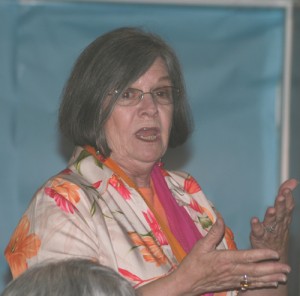On Thursday, June 23, about 40 people gathered at the Idyllwild School multi-purpose room to discuss tolerance and diversity in Idyllwild in the wake of graffiti hate crimes that began in March 2010 and a subsequent and ongoing wave of graffiti incidents. 
This “Community Dialogue,” using a discussion template developed by the Department of Justice (DOJ), was the followup to the June showing of the Holocaust themed documentary “Paper Clips.” This session was intended to be a facilitated discussion of the roots of intolerance and how, ultimately, to promote tolerance and mutual respect in Idyllwild.
DOJ facilitator James Williams III opened the dialogue by asking the attendees to share their first memories of discrimination, of stereotyping, and how much contact they have with people different from themselves
“What James [Williams] has for us here is not the solution,” said local organizer Bill Sanborn. “It is a process. The purpose is to dialogue together and to come together to find tangible, measurable outcomes, to be here to listen to what the others have to say. This is ‘our time.’”
Participants next discussed their recent experiences of discrimination, including any in Idyllwild, what the circumstances of those experiences were, and whether those kinds of experiences were frequent or rare.
After several specific and personal examples of local problems and expression of concern for safety, participants talked about what needed to happen in Hill communities for everyone to have more positive experiences with those who are different and to feel safe in the community.
Besides acts of religious and racial discrimination, participants expanded the conversation to include gender, sexual orientation and ethnic discrimination. Surprisingly to many in the audience, and contrary to the idyllic and Brigadoon-like image many have of Idyllwild, discussion revealed a community in which at least some feel unsafe and unappreciated for who they are. It also revealed a community in search of ways to come together, to discuss, to socialize and work to solve problems that could, if left hidden or unaddressed, change the character and complexion of Idyllwild.
Over and over in the 2-hour meeting, participants returned to the need for greater communication among Idyllwild’s disparate groups — with Hispanics, with gays, with parents of children in difficulty, with seniors, with young adults, with the wider community. One woman, acknowledging the need for engagement, said, “I can’t stay in my house with my door shut. We need community conversations.” Others spoke of the need to “show up” with regard to community problems, to stop denying that problems exist here, and to make personal commitments to help increase tolerance and mutual respect in the community. As DOJ’s Williams noted, “I can’t care for this place more than you can. This is, and needs to be, a grassroots effort.”
Some wanted solutions sooner than later, like apprehending the graffiti culprits or starting a Neighborhood Watch. Others wanted to discuss and delve more deeply into root causes of intolerance within the community, the creation of divisions, of stereotyping and incivility. In the end, there was a decision to continue the discussion at another meeting.
“Each person here please bring another to the next meeting,” said local organizer Pete Capparelli. “Wear a paper clip as a symbol of your opposition to intolerance.”
The next meeting, a potluck, is set for 6 p.m. Wednesday, July 20 at the Idyllwild School multi-purpose room. This is an opportunity for groups and people who don’t normally associate to come together for the community’s common good.
The March and September 2010 graffiti hate crimes were anti-Semitic in nature, with swastikas and slogans that even Sheriff’s investigators found shocking. During that same period, the Idyllwild Dog Park was tagged with the words “White Power.” Since this kind of public virulence had not been seen in Idyllwild previously, the meetings’ organizing group believed a community discussion both about the events and how to respond would be helpful.










